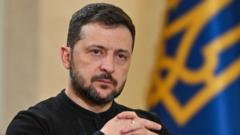Ukraine's President Volodymyr Zelensky is currently in a challenging position following a contentious meeting at the White House with President Donald Trump last Friday. The meeting resulted in a suspension of US aid, constraining Zelensky's options as he confronts mounting pressures both domestically and internationally.
Senator Lindsey Graham, once an ally, has publicly suggested that Zelensky either resign or make significant changes to his administration to restore US support—a stark ultimatum for an elected leader navigating a relentless war against Russian forces. Speculation surrounds the possibility of an apology to Trump as a potential route for regaining favor. Despite the turbulence, Zelensky's Prime Minister indicated that Kyiv is open to negotiations over a minerals deal with the US, which could be beneficial for both nations.
During his meeting with Trump, Zelensky had been prepared to finalize this deal; however, he was promptly dismissed. Trump's message was clear: without concessions, Ukraine would struggle to regain its footing with the US. Nevertheless, Zelensky, as the leader of a nation under siege for three years, cannot afford a total capitulation to external pressures. Crafting a response that appeases Trump without undermining national pride is crucial, especially as many Ukrainians are resistant to any notion of appeasement.
A looming concern remains regarding the halt of essential military aid from the US, which is critical for Ukraine's defense capabilities. Ukrainian officials have voiced alarm over the suspension, fearing diminished resources in their protracted conflict against Russia. Although Zelensky has ruled out resignation, citing democratic processes, the looming specter of Putin's influence colors the conversation.
With this backdrop, discussions have emerged regarding reliance on European allies to fill the void of US support. European nations have committed significant resources to Ukraine; however, they emphasize that US guarantees remain indispensable for effective defense strategies. Prime Minister Denys Shmyhal noted Ukraine's increasing capability in domestic arms production, but acknowledged that certain high-tech defense systems are solely reliant on US provision.
The unfolding dynamics continue to present Zelensky with stark choices shaped by geopolitics, domestic sentiment, and the exigencies of wartime leadership.





















